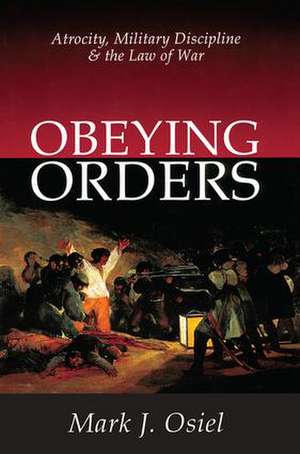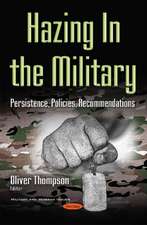Obeying Orders: Atrocity, Military Discipline and the Law of War
Autor Mark J. Osielen Limba Engleză Paperback – 30 aug 2001
| Toate formatele și edițiile | Preț | Express |
|---|---|---|
| Paperback (1) | 420.08 lei 6-8 săpt. | |
| Taylor & Francis – 30 aug 2001 | 420.08 lei 6-8 săpt. | |
| Hardback (1) | 764.20 lei 6-8 săpt. | |
| Taylor & Francis – 12 oct 2017 | 764.20 lei 6-8 săpt. |
Preț: 420.08 lei
Nou
Puncte Express: 630
Preț estimativ în valută:
80.41€ • 87.37$ • 67.59£
80.41€ • 87.37$ • 67.59£
Carte tipărită la comandă
Livrare economică 21 aprilie-05 mai
Preluare comenzi: 021 569.72.76
Specificații
ISBN-13: 9780765807984
ISBN-10: 076580798X
Pagini: 408
Dimensiuni: 152 x 229 x 26 mm
Greutate: 0.54 kg
Ediția:Revised
Editura: Taylor & Francis
Colecția Routledge
Locul publicării:Oxford, United Kingdom
ISBN-10: 076580798X
Pagini: 408
Dimensiuni: 152 x 229 x 26 mm
Greutate: 0.54 kg
Ediția:Revised
Editura: Taylor & Francis
Colecția Routledge
Locul publicării:Oxford, United Kingdom
Cuprins
I: Obedience to Superior Orders; 1: Virtues and Vices of Military Obedience; 2: Tie Law of Military Obedience; 3: The Uncertain Scope of “Manifest” Illegality; 4: Sparse and Unsettled Rules; 5: The Weightlessness of Moral Gravity; 6: Irregularity amidst Procedural Formality; 7: Atrocities “Vanish” by Verbal Artistry; 8: Views of Atrocity im Legal Theory: Positivist, Naturalist and Postmodernist; 9: Individual Responsibility for Systemic Horrors?; II: Averting Atrocity; 10: Legal Norms and Social Practices in Military Life; 11: Cold Hearts and the Heat of Battle: Atrocity from Above or from Below?; 12: Permutations on Perversity: Atrocity by Connivance and Brutalization; 13: Why Do Men Fight?; 14: Morale and Morality: An Uneasy Relationship; III: Freedom and Constraint in Military Life and Law; 15: Rules vs. Standards m Military Law; 16: Martial Courage as Moral Judgment; 17: Promoting Practical Judgment; 18: What Soldiers Know; 19: Misreading Orders Morally; 20: Disobedience as Creative “Compliance”; 21: Living with Lawyers; 22: Applying Applied Ethics, or Where the Rubber Hits the Road; Conclusion
Descriere
Osiel argues that international and military law could more effectively prevent combat atrocities by studying how and why they occur. The author explores the moral and legal ambiguity of military discipline and the dilemma of obedience. The evidence is drawn from a wide array of recent wars and peace enforcement operations.














